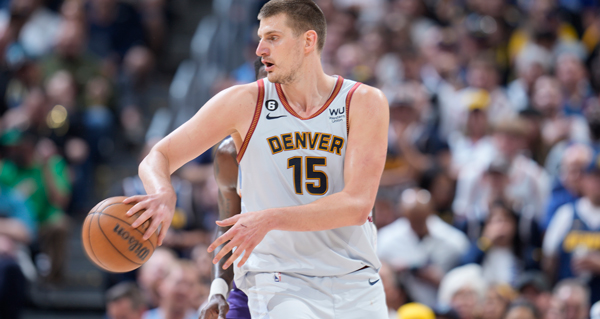Looming in the stands during all of his Denver Nuggets games are Nikola Jokic’s two gigantic brothers. Strahinja, the oldest, looks especially like a guy Steven Seagal struggles to beat up in a penultimate fight scene, but Nemanja fits the bill as well. Many have recently discovered these fearsome two, but they’ve been part of American basketball for longer than their significantly younger brother—who just happens to have won the 2023 NBA Finals MVP trophy. Nemanja moved from Serbia to Detroit with No. 2 overall draft pick Darko Milicic in 2003, selected just after LeBron James, to enjoy the spoils of the promised land. Strahinja is his godfather.
Milicic’s failed career—littered with wild parties, flashy cars, and the weight of expectations that were downright geo-cultural—is a parable that hovers just out of the frame of the Jokic story, in the same way that his brother’s bodies are always only a few steps from the court when he plays. Both moved with him to Denver, whether he wanted them to or not, when he joined the Nuggets in 2015 as a 21-year-old. No one has ever confused Jokic for the partying sort, but his brothers, along with his girlfriend (now his wife, and the mother of his child) were there to keep him studious, focused, and ascetic like Milicic was not. They would shelter him from the excesses always waiting to destroy millionaires in the world’s richest nation, make sure that he wouldn’t go out alone into America.
The result has been a two-time MVP with an aversion for public life that we haven’t seen since the mysterious and stolid Tim Duncan was atop the sport. In the wake of the Denver Nuggets’ championship accomplishment on Monday, the contrast of Jokic’s monastic approach in an over-sauced landscape of media narratives, financial incentives, and performed virtue reached hilarious new heights. He just wanted to go home; back to Serbia, where he can harness-race with his beloved horses. They are in a contest on Sunday, he mentioned, and when this Thursday’s championship parade in Denver was presented as an obstacle to his being there with his beautiful animals, Jokic’s disturbance was visible.
A lot of morality is projected onto superstar athletes who resist the shinier (more ego-feeding, more profitable) parts of fame. Judging the personal qualities of players we can only see limited pieces of, even in the case of the more willfully exposed, is a fool’s errand; but there’s little doubt that Jokic’s unusually reticent attitude about the multi-industrial options available to him is more therapeutically advisable than the opposing epicurean, have-it-all mode of celebrity. His greatest gifts include his tremendous size and his probably unparalleled hand speed, but his holistic disposition is equally valuable on the floor, and he intensely protects this boundlessly generous gamesmanship from indulgence and dilution.
It would be wrong to view his immediate flight back to his homeland after every season as just something he does to keep himself right for the hardwood, though. He does it because he wants to. When work is over, he is not interested in the semi-formal afterparty, the cocktail hour where impressions still professionally matter and you don’t really get to relax. Work is meaningful, sure, but not so much that he wants to live within its lines any longer than he has to. “It’s not everything in the world,” he said, moments after winning the championship. “There’s a bunch of things that I like to do. That’s a normal thing. Nobody likes his job.”
It was with these words that Jokic solidified himself in NBA history as the sport’s least American MVP. There are previous immigrants who’ve won the award: Hakeem Olajuwon, Dirk Nowitzki, Giannis Antetokounmpo, and this year, Joel Embiid. But all have embraced their adoptive country in ways that Jokic has not—typically in the form of extolling the value of work; labor has, in terms of American history, been framed as a kind of gift, rich with healing, transformative powers. This belief is best distilled in the concept of the Protestant work ethic, which nearly all newly glorified Americans have championed. To believers of this principle, work is not, as Jokic puts it, just a thing you have to do and then clock out from.
Antetokounmpo, for instance, provided inspirational fodder for LinkedIn pages about how failure is part of the road to success after his postseason defeat this April. Falling short of a championship was acceptable, but only in terms of how it could help lead to a future championship, later on. Jokic, after winning it all, said that, actually, doing so—and success, more generally—ultimately doesn’t matter that much. For saying as much, he is unlikely to ever be quoted in the same kinds of business slideshows, or provided by many American corporations and capitalists as a leading example of how to live. The work is there, obviously; you don’t get to be as good as he is without putting in grueling hours.
But for Jokic, work is but a subtext for life, and his is one he wants to keep to himself. He’s contractually obligated to give a certain amount of interviews, but during the last few years, as his profile exploded, he stopped granting any beyond the required minimum. Now that he is a champion and a personal curiosity at a mass-culture scale, demand for his availability will outpace supply even further. Perhaps he will grow more comfortable appeasing these forces and letting strangers around the world know him better, but there is no sign that he will. Not only does his family know what too much America can do to a man, but there is already enough of Jokic out there, watchable for everyone, to gain him nearly half-a-billion dollars from the Nuggets through 2028. Most likely, we will see him play hundreds of more basketball games, and goof uncannily through his media duties, and then that—which is enough—will be all.



